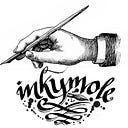Artofficial Inktelligence IV — the Mina Murati interview
To create is human, to use tools is also human.
I‘ve been resisting commenting on the Mira Murati thing because I am, funnily enough, really busy (guess what) creating stuff.
While commenters were understandably serving tweet-sized chunks of derision in the OpenAI CTO’s direction, they laudibly appeared to be centred around the scraping of data and her throwaway remarks — on a Dartmouth University stage — that some of the “creative” jobs (her air quotes not mine) set to be lost to AI “maybe should not have been there in the first place”.
Of course this comment should be picked up on — the whole interview, conducted by a host subtly displaying the behavioural traits of an enchanted teenage boy, was full of unpleasant gems that merit isolation, discussion and dismantling (the purpose of a talk in a university setting, right? not to recruit or sell products?). But it wasn’t what stood out to me.
Despite the obvious academic ability, I’m thinking there’s a vacant space in Murati’s head where an understanding of human creativity should be. It was her allegation that creativity is “this very special thing” (with the ve-e-e-e-ery drawn out in a light sneer) “that’s only available to a few out there”. Already that’s a lot to unpack — the ‘out there’ speaks vividly to the othering I was observing in AI, which wrote about in my first three AI articles: there’s You Lot — the Artist Gatekeepers (and she actually used this word, accusing artists yet again of somehow actually putting effort into keeping people out — who, exactly?) and Everyone Else.
She goes on to postulate that “you’ve got these tools that lower the barrier for anyone to think of themselves as creative”.
And there it is. All my adult life I‘ve been telling adults and children alike that humans are inherently creative, it’s just that not every human elects to channel that creativity into a specific job or vocation that ‘looks’ creative — such as my job, artist/illustrator/lettering artist. I make pictures, so people think I’m creative. But it’s there, everywhere, every day. If you’ve ever watched a plumber solve a particularly challenging piping problem with a complex alignment of copper pipes, or a builder carefully finish the top of a wall with a specific choice of material, or seen a chef compose a dish on a plate, you’ve watched creativity in action. A Mum who devises a household system to keep on track with the family’s commitments and homework. And my accountant, who’s still my accountant twenty years later because I’m in awe of how he translates and remixes the intriguing language of sums, percentages and taxes into a picture I can read.
As a species, we apply creativity every day.
I’ve spent so much time speaking in schools where one of the first things I hear is “but I can’t draw”, which if left unchecked evolves into “‘I’m not creative,” which is frankly bollocks. We all are — we just deploy it in different ways and engage with it to varying levels throughout our lives. We can lose it, though, through discouragement or lack of practise, or lack of opportunity to practise — but it is always there: I refer you to this wonderful, poignant TED Talk by Ted Robinson.
I’ve even been on the receiving end of that subconscious resentment, in the form of comments like “it’s OK for you, you’re creative”, or “but I bet you were born creative”. I was, but so were you, my friend.
All of which is why Murati’s claim that AI is somehow lifting an invisible, crusty, thousands-of-years-old barrier to a mass of human beings whom she seems to lump together as the poor suffering uncreatives, and that her company’s products will elevate creatively barren cavepeople to the previously unavailable level of ‘artist and beyond’ is patronising, bordering on hubristic. Being an artist is not magic, it’s work, focus, training, practise, graft, cycling through failure and success. Equally, software, no matter how brilliantly sophisticated, is not actual magic either. Being creative is magic, but it’s a ‘magic’ we’re all born with.
I’ve seen the pretty pictures AI can spit out, the useful things it can do; this observation is nothing to do with fear or lack of engagement from my perspective. I use it, I’m interested in it — how could I not be? But Murati’s interview, together with her TL;DR Twitter response (which I did read), has been tossed through all the social media channels like the word-salad it is, for good reason: it lays bare the weaponisation of the perception that creativity is, and has only ever been ‘for the few’. Like any good military strategy, setting us against each other is working; it’s evident in the the angry yelling of panicked artists working in a disrupted landscape whose work’s been scraped to train the AI models (mine included), in the AI bros likening the rapid growth of AI to a rape you just have to let happen, in the dollars fired in the direction of the AI corporations, and in the wholesale rush to push AI into everything we use, whether we want it or not. ‘Divided we fall’ is too dramatic and not quite right, but there’s something akin to divide and conquer lurking in the ether.
